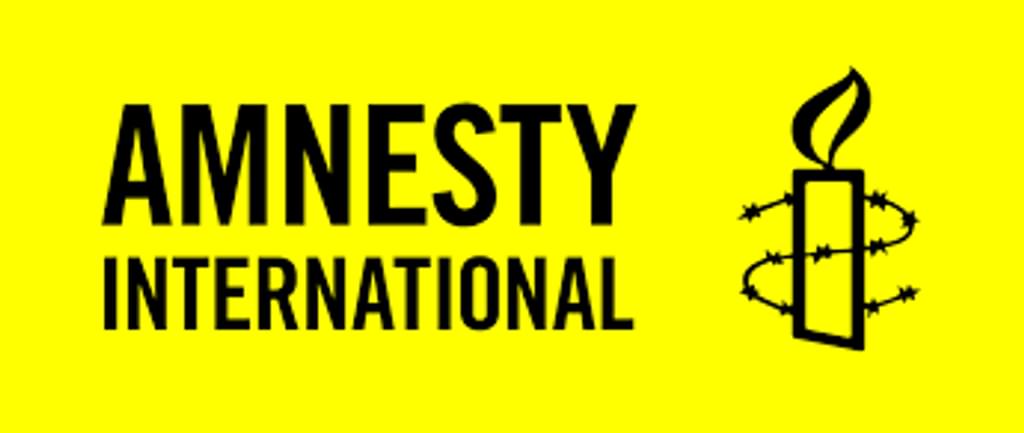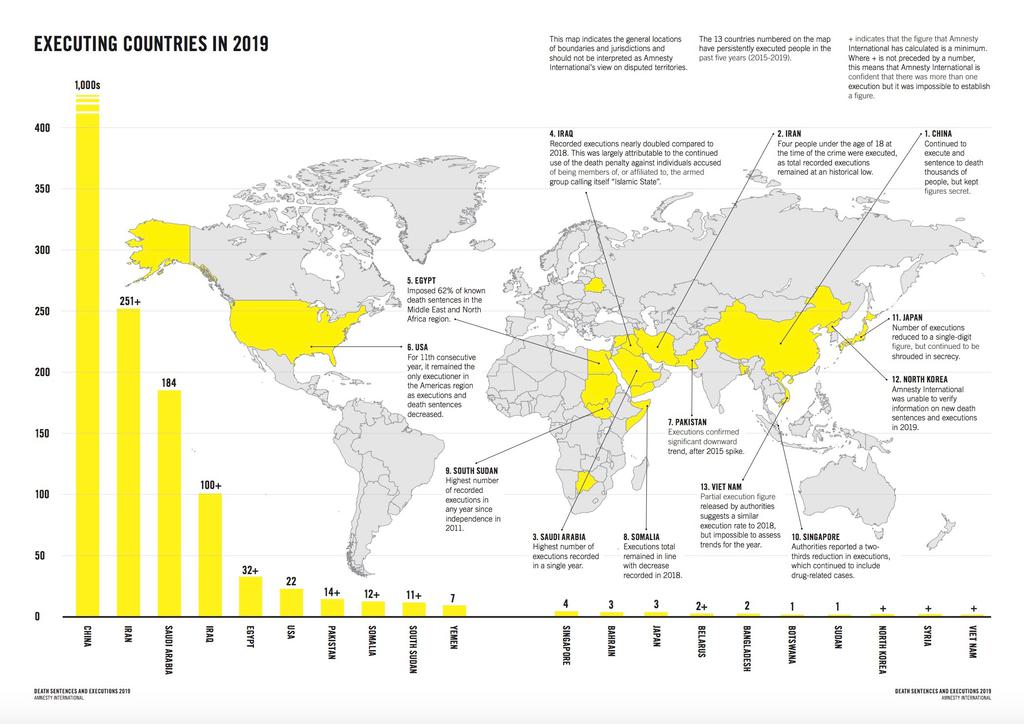
Executions across the globe fell 5% worldwide in 2019 to the fewest in more than a decade, despite a record number of executions in Saudi Arabia, Amnesty International reported in the human rights organization’s Global Report: Death Sentences and Executions in 2019.
The Amnesty report, released April 21, 2020, detailed rising political abuse of the death penalty in the Middle East, but said the region’s increased executions were offset by declines in executions in the Asia-Pacific region and elsewhere in the world. Amnesty said that in the countries for which it was able to obtain reliable data, nations carried out at least 657 executions in 2019, down from the already decade-low number of at least 690 recorded in 2018. The number of confirmed executions in 2019, the report said, was “one of the lowest figures that Amnesty International has recorded in any given year since it began its monitoring of the use of the death penalty in 1979.” However, the human rights organization said that efforts by countries to hide the extent of their death penalty usage confounded its ability to assess the significance of the decline.
As in previous years, the execution total does not include the estimated thousands of executions carried out in China, which treats data on the death penalty as a state secret. China is thought to have carried out more executions in 2019 than the rest of the world combined. Excluding China, 86% of all reported executions were concentrated in just four Middle Eastern countries — Iran (251+), Saudi Arabia (184), Iraq (100+), and Egypt (32+). The 22 executions in the U.S. were the sixth most of any nation, although Vietnam’s and North Korea’s execution totals are not known.
Amnesty recorded at least 2,307 death sentences in 56 countries in 2019, a 9% decline from the 2,531 reported in 2018. However, Amnesty believes that number is artificially low as a result of the unavailability of reliable information from Malaysia, Nigeria and Sri Lanka, three nations that had reported significant numbers of death sentences in previous years. Five countries are confirmed to have imposed more than 100 death sentences in 2019: Pakistan (632+), Egypt (435+), Bangladesh (220+), India (102), Zambia (101). The U.S. ranked 12th, with 35 new death sentences imposed. Because of state secrecy, Amnesty was also unable to obtain information on new death sentences imposed in China, Iran, North Korea, and Syria.

In a web posting accompanying the release of the report, Clare Algar, Amnesty International’s Senior Director for Research, Advocacy and Policy, credited the continuing worldwide decline in executions to the recognition by “[a] large majority of countries” that “[t]he death penalty is an abhorrent and inhuman punishment; and there is no credible evidence that it deters crime more than prisons terms.” Against this trend, Algar said, “a small number of countries … increasingly resort[ed] to executions.”
Saudi Arabia beheaded 184 people in 2019, up from 149 in 2018 and the most since Amnesty began tracking executions in the country. Executions in Iraq increased from at least 52 in 2018 to at least 100 in 2019.
Algar characterized Saudi Arabia’s “growing use of the death penalty, including as a weapon against political dissidents,” as “an alarming development.” The report noted that more than half of those executed were foreign nationals. Amnesty documented numerous human rights abuses in Saudi Arabia’s use of the death penalty, including its use to punish non-violent drug offenses, its increased use as a political weapon against Shi’a Muslim dissidents, the use of confessions obtained through torture, and the execution of prisoners for alleged offenses when they were juveniles.
Algar described “the massive jump in executions in Iraq” as “shocking.”
By comparison, the report said executions in Iran “remained at an historical low” as a result of amendments in 2017 that reduced the number of drug-related offenses to which the death penalty applied. Amnesty reported that Iran had at least 251 executions in 2019, roughly on par with the at least 253 carried out in 2018, but less than half the number recorded in 2017.
Amnesty also assailed the lack of transparency in many nations’ execution practices. “Even countries that are the strongest proponents of the death penalty struggle to justify its use, and opt for secrecy,” Algar said. “Many of them take pains to hide how they use the death penalty, knowing it will not stand up to international scrutiny.”
The report said state secrecy “hindered Amnesty International’s full assessment of the global use of the death penalty. Major executing countries … continued to hide the full extent of their use of the death penalty by restricting access to death penalty-related information.” Some countries, including Belarus, Botswana, Iran, and Japan, “carried out executions without announcing them in advance or giving advance notices to families or legal representatives of people executed,” Amnesty reported, and sometimes provided no advance notice to the prisoners themselves.
Amnesty reported that at least 26,604 people were known to be on death rows around the world at the end of 2019, 38% more than the 19,336 people known to have been on global death rows at the end of 2018. With known death sentences down, the increase more likely reflects better information gathering, rather than a surge in the death-row population.
Amnesty International opposes the death penalty in all circumstances and, the report says, “campaigns for total abolition of capital punishment.”
Sources
Amnesty International, Global Report: Death Sentences and Executions 2019, April 21, 2020; Amnesty International, Death penalty in 2019: Facts and figures, April 21, 2020; News Release, DEATH PENALTY 2019: GLOBAL EXECUTIONS FELL BY 5%, HITTING A 10-YEAR LOW, Amnesty International, April 21, 2020; Christopher Brito, Saudi Arabia executed more than 180 people last year, breaking its own record, Amnesty International says, CBS News, April 21, 2020; Saphora Smith, Saudi Arabia executed record number last year, Amnesty report finds, NBC News, April 21, 2020; John Bowden, Amnesty International: Saudi Arabia had record number of executions last year, The Hill, April 21, 2020; Saudi Arabia executed record number of people in 2019 – Amnesty, BBC News, April 21, 2020; Amnesty International Says Executions Fall To Lowest Number In A Decade, But Secrecy Skews Count, Radio Free Europe, April 20, 2020.
International
Mar 15, 2024

Women’s History Month Profile Series: Sarah Belal, Executive Director of Justice Project Pakistan
Human Rights
Mar 12, 2024


